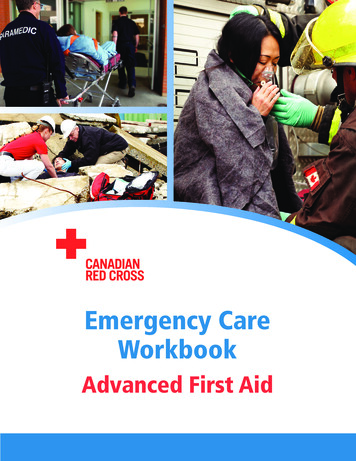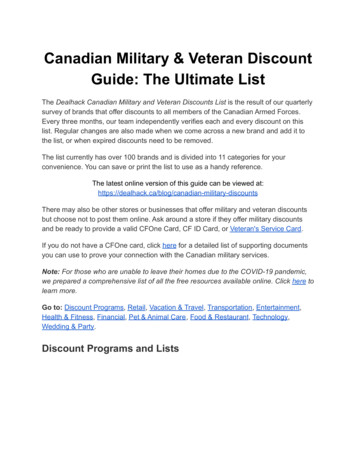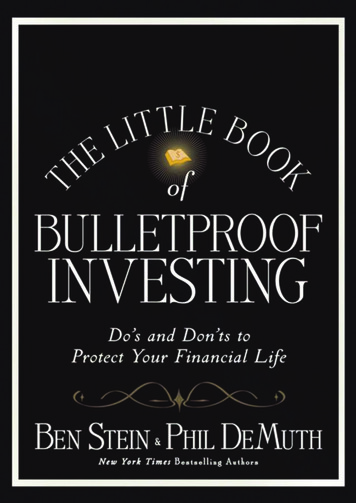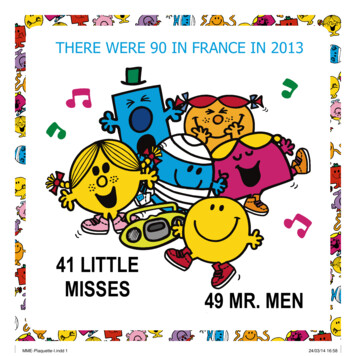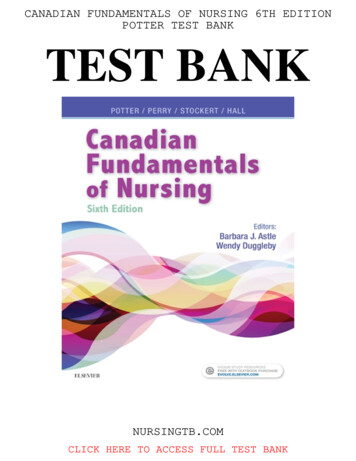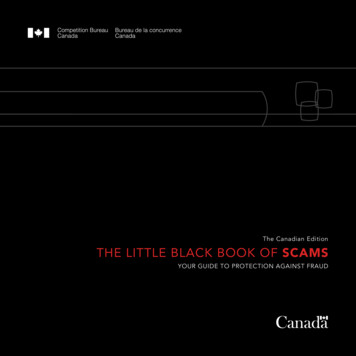
Transcription
The Canadian EditionTHE LITTLE BLACK BOOK OF SCAMSYOUR GUIDE TO PROTECTION AGAINST FRAUD
First published by the Competition Bureau Canada 2012Reproduced with permission from the Australian Competition and Consumer CommissionIllustrations by Pat CampbellThis publication is available online at: /03074.html.To obtain a copy of this publication, or to receive it in an alternate format (Braille, large print, etc.), please fill out thePublication Request Form or contact:Information Centre – Competition Bureau50 Victoria Street, Gatineau, QC K1A 0C9Tel.: 819-997-4282Toll free: 1-800-348-5358TTY (for hearing impaired): 1-800-642-3844Fax: 819-997-0324Website: www.competitionbureau.gc.caPermission to reproduceExcept as otherwise specifically noted, the information in this publication may be reproduced, in part or in whole andby any means, without charge or further permission from the Competition Bureau provided due diligence is exercisedin ensuring the accuracy of the information reproduced; that the Competition Bureau is identified as the source institution; and that the reproduction is not represented as an official version of the information reproduced, nor as havingbeen made in affiliation with, or with the endorsement of the Competition Bureau.For permission to reproduce the information in this publication for commercial purposes, please fill out the Application for Crown Copyright Clearance or contact the:Web Services CentreInnovation, Science and Economic Development CanadaC.D. Howe Building235 Queen StreetOttawa, ON K1A 0H5CanadaTelephone (toll-free in Canada): 1‑800‑328‑6189Telephone (international): 613‑954‑5031TTY (for hearing impaired): 1‑866‑694‑8389Business hours: 8:30 a.m. to 5:00 p.m. (Eastern Time)Email: ISED@Canada.ca Her Majesty the Queen in Right of Canada, represented by the Minister of Industry, 2017.Cat. No. Iu54-42/2017ISBN 978-0-660-07569-3Aussi offert en français sous le titre Le petit livre noir de la fraude.
The Canadian EditionTHE LITTLE BLACK BOOK OF SCAMSYOUR GUIDE TO PROTECTION AGAINST FRAUD
FOREWORDMINISTER’S MESSAGEConsumer confidence in the marketplaceis of the utmost importance for thegovernment. Informed and aware consumersare important players in an innovationeconomy.That’s why we encourage all Canadians toempower themselves by reading The LittleBlack Book of Scams and take note of itstips on how to stop fraudsters in their tracks.This booklet outlines many of the mostcommon types of scams, and lists the contactinformation of fraud-fighting agencies thatare there to help.unburdened by the high cost of fraud in boththe traditional and digital economies.Fraudsters are becoming more sophisticatedin their methods, but so are consumers.You can make a difference not only in yourown life, but in the lives of the people youcare about by recognizing, rejecting andreporting fraud. This booklet in its printed,online and video editions is an importantstep in that direction.Hon. Navdeep Bains,Minister of Innovation, Science andEconomic DevelopmentI believe in a Canada that is a nationof innovators, one that is aware andCOMMISSIONER’S MESSAGEFraud is a crime that threatens everyCanadian, regardless of their education,age or income. Scammers use a variety ofdevious tactics to defraud unsuspectingvictims, such as imitating well-known brandsonline and using deceptive claims to enticeconsumers through telemarketing, emails orsocial media.The Competition Bureau works to protect allCanadians by cracking down on deceptivemarketers and ensuring consumers have theinformation they need to make informedpurchasing decisions.Our Little Black Book of Scams aims toincrease your awareness of the manydifferent kinds of fraud that targetCanadians. It provides tips on how to protectyourself and debunks common myths thatmight allow fraudsters to gain your trust.Since we first launched the booklet inMarch 2012, it has remained one of our mostpopular publications. We’ve distributed morethan 100,000 printed copies to Canadians,and our online version has been visited ordownloaded from the Competition Bureau’swebsite more than 250,000 times.I am very grateful to the AustralianCompetition and Consumer Commission,who originally developed The Little BlackBook of Scams and granted us permission toproduce this edition for Canadians.John PecmanCommissioner of Competition
CONTENTSIntroduction1Lotteries, sweepstakes and contests2Pyramid schemes4Money transfer requests6Internet scams8Mobile phone scams10Health and medical scams12Emergency scams14Dating and romance scams16Charity scams18Job and employment scams20Small business scams22Service scams24Handy hints to protect yourself26Scams and you: What to do if you get scammed!28Getting help and reporting a scam29
MYTH BUSTERSBusting these common myths will minimize your chances of being scammed. All companies, businesses and organizationsare legitimate because they are licensed andmonitored by the government: This is notalways true. While there are rules about settingup and running a business or a company inCanada, scammers can easily pretend to haveapproval when they don’t. Even businessesthat are licensed could still try to scam you byacting dishonestly. All Internet websites are legitimate: This is notalways true. Websites are quite easy and cheap toset up. The scammers can easily copy a genuinewebsite and trick you into believing it is legitimate. There are short cuts to wealth that only a fewpeople know: This is not always true. Askyourself the question: if someone knew a secretto instant wealth, why would they be tellingtheir secret to others? Scams involve large amounts of money: This isnot always true. Sometimes scammers target alarge number of people and try to get a smallamount of money from each person. Scams are always about money: This is not alwaystrue. Some scams are aimed at stealing personalinformation from you.GOLDEN RULESRemember these golden rules to help you beat the scammers. Always get independent advice if an offerinvolves money, personal information, time orcommitment. There are no guaranteed get-rich-quickschemes—sometimes the only people who makemoney are the scammers. Do not agree to offers or deals right away. Ifyou think you have spotted a great opportunity,insist on time to get independent advice beforemaking a decision. Do not hand over money or personal information,or sign anything until you have done yourhomework and checked the credentials of thecompany that you are dealing with. Do not rely on glowing testimonials: find solidevidence of a company’s success. Log directly on to a website that you areinterested in rather than clicking on linksprovided in an email. Never send money, or give credit card oronline account details to anyone you do notknow and trust. If you spot a scam or have been scammed, gethelp. Contact the Canadian Anti-Fraud Centre,the Competition Bureau or your local police forassistance. See page 29 for contact information.Scammers are imaginative and manipulative. They know how to push your buttons to producethe response they want.
INTRODUCTIONEvery year, Canadians lose millions of dollars to the activitiesof scammers who bombard us with online, mail, door-to-doorand telephone scams.We are pleased to bring you the first Canadian edition of The Little Black Book of Scams. Wehope this book will increase your awareness of the vast array of scams that target Canadiansand share with you some easy steps you can take to protect yourself.SCAMMERS DO NOT DISCRIMINATEScammers target people of all backgrounds,ages and income levels. Fake lotteries,Internet frauds, get-rich-quick schemes andmiracle health cures are some of the favouredmeans of separating the unwary from theirmoney. New varieties of these scams appearall the time.The Competition Bureau has seen thedevastating effects scams can have on peopleand their families. One of the best ways tocombat this kind of fraud is to take measuresto prevent yourself from being caught in thefirst place.PROTECT YOURSELFIf you want to stay on top of scams, informyourself on how to recognize the varioustypes of scams and protect your personalinformation by visiting law enforcementorganizations’ websites, the Canadian AntiFraud Centre (www.antifraudcentre.ca) orother reputable organizations.
2LOTTERIES, SWEEPSTAKES ANDCONTESTSMany Canadians are lured by the excitement of a surprisewin and find themselves sending huge amounts of moneyto claim fake prizes.WHAT TO LOOK FORYou cannot win money or a prize in a lotteryunless you have entered it yourself, orsomeone else has entered it on your behalf.You cannot be chosen as a random winner ifyou don’t have an entry.Many lottery scams try to trick you intoproviding your banking and personal detailsto claim your prize. You should not have topay any fee or tax to claim a legitimate prize.Don’t be fooled by claims that the offer islegal or has government approval—manyscammers will tell you this. Instead ofreceiving a grand prize or fortune, you willlose every cent that you send to a scammer.And if you have provided other personaldetails, your identity could be misused too.A fake prize scam will tell you that you havewon a prize or a contest. You may receive aphone call, an email, a text message or see apop-up screen on your computer. There areoften costs involved with claiming your prize,and even if you do receive a prize, it may notbe what was promised to you.The scammers make their money by makingyou pay fees or taxes, call their premiumrate phone numbers or send premium textmessages to claim your prize. These premiumrate calls can be very expensive, and thescammers will try to keep you on the linefor a long time or ask you to call a differentpremium rate number.
!PROTECT Legitimate lotteries do not require you to pay a fee or tax to collect winnings.Never send money to anybody you don’t know and trust.Don’t provide personal banking details to anyone that you do not know and trust.Examine all of the terms and conditions of any offer very carefully—claims of free or verycheap offers often have hidden costs. Calls to premium rate phone numbers or premium textmessages can be very expensive.Did I enter this contest? You cannot win money or a prize in a contest unless you haveentered it yourself, or someone else has entered it on your behalf.
4PYRAMID SCHEMESPyramid schemes promise a large financial return for arelatively small cost. Pyramid schemes are illegal and veryrisky—and can cost you a lot of money.WHAT TO LOOK FORIn a typical pyramid scheme, unsuspectinginvestors are encouraged to pay largemembership fees to participate in moneymaking ventures. The only way for you toever recover any money is to convince otherpeople to join and to part with their moneyas well. People are often persuaded to joinby family members or friends. But thereis no guarantee that you will recoup yourinitial investment.Although pyramid schemes are often cleverlydisguised, they make money by recruitingpeople rather than by selling a legitimateproduct or providing a service. Pyramidschemes inevitably collapse and you willlose your money. In Canada, it is a crimeto promote a pyramid scheme or even toparticipate in one.Ponzi schemes are fraudulent investmentoperations that work in a similar way topyramid schemes. The Ponzi scheme usuallyentices new and well-to-do investors byoffering higher returns than other investmentsin the form of short-term returns that areeither abnormally high or unusually consistent.The schemer usually interacts with all theinvestors directly, often persuading most of theexisting participants to reinvest their money,thereby minimizing the need to bring in newparticipants as a pyramid scheme will do.Be cautious, but do not be discouraged fromcarefully researching business opportunitiesbased on commissions. There are manylegitimate multi-level marketing opportunitieswhere you can legally earn an income fromselling genuine products or services.
!PROTECT Pyramid and Ponzi schemes may be sent to you from family members and people you trust—they might not know that they could be illegal or that they are involved in a scam.Never commit to anything at high-pressure meetings or seminars.Don’t make any decisions without doing your homework—research the offer being made andseek independent advice before making a decision.Do some research on all business opportunities that interest you.If I am not selling a genuine product or service, is participation in this activity legal?
6MONEY TRANSFER REQUESTSMoney transfer scams are on the rise. Be very careful whensomeone offers you money to help transfer their funds. Onceyou send money to someone, it can be very difficult, if notimpossible, to get it back.WHAT TO LOOK FORThe Nigerian scam (also called the 419 fraud)has been on the rise since the early-to-mid1990s in Canada. Although many of thesesorts of scams originated in Nigeria, similarscams have been started all over the world(particularly in other parts of West Africa andin Asia). These scams are increasingly referredto as “advance fee fraud”.In the classic Nigerian scam, you receive anemail or letter from a scammer asking yourhelp to transfer a large amount of moneyoverseas. You are then offered a share of themoney if you agree to give them your bankaccount details to help with the transfer. Theywill then ask you to pay all kinds of taxes andfees before you can receive your “reward”.You will never be sent any of the money, andwill lose the fees you paid.Then there is the scam email that claims to befrom a lawyer or bank representative advisingthat a long-lost relative of yours has diedand left you a huge inheritance. Scammerscan tell such genuine sounding stories thatyou could be tricked into providing personaldocuments and bank account details so thatyou can confirm their identity and claim yourinheritance. The “inheritance” is likely to benon-existent and, as well as losing any moneyyou might have paid to the scammer in feesand taxes, you could also risk having youridentity stolen.If you or your business is selling productsor services online or through newspaperclassifieds, you may be targeted by anoverpayment scam. In response to youradvertisement, you might receive a generous
offer from a potential buyer and accept it. Youreceive payment by cheque or money order,but the amount you receive is more than theagreed price. The buyer may tell you that theoverpayment was simply a mistake or theymay invent an excuse, such as extra moneyto cover delivery charges. If you are asked torefund the excess amount by money transfer,be suspicious. The scammer is hoping thatyou will transfer the refund before youdiscover that their cheque or money orderwas counterfeit. You will lose the transferredmoney as well as the item if you have alreadysent it.!PROTECT If you have been approached by someone asking you to transfer money for them, it isprobably a scam.Never send money, or give credit card or online account details to anyone you do not knowand trust.Don’t accept a cheque or money order for payment for goods that is more than what youagreed upon. Send it back and ask the buyer to send you payment for the agreed amountbefore you deliver the goods or services.Examine the information on the Canadian Anti-Fraud Centre website for information on howto protect yourself against money transfer scams.Is it really safe to transfer money for someone I do not know?
8INTERNET SCAMSA lot of Internet scams take place without the victimeven noticing. You can greatly reduce the chances ofbeing scammed on the Internet if you follow some simpleprecautions.WHAT TO LOOK FORScammers can use the Internet to promotefraud through unsolicited or junk emails,known as spam. Even if they only get ahandful of replies from the millions of emailsthey send out, it is still worth their while. Bewary of replying, even just to “unsubscribe”,because that will give a scammer confirmationthat they have reached a real email address.Any email you receive that comes from asender you do not know, is not specificallyaddressed to you, and promises you somebenefit is likely to be spam.Malicious software—also referred to asmalware, spyware, key loggers, trojan horses,or trojans—poses online security threats.Scammers try to install this software on yourcomputer so that they can gain access to filesstored on your computer and other personaldetails and passwords.Scammers use a wide range of tricks to gettheir software onto your computer. They maytrick you into clicking on a link or pop-upmessage in a spam email, or by getting youto visit a fake website set up solely to infectpeople’s computers.Phishing scams are all about tricking you intohanding over your personal and banking detailsto scammers. The emails you receive mightlook and sound legitimate but in reality genuineorganizations like a bank or a governmentauthority will never expect you to send yourpersonal information by an email or online.
Scammers can easily copy the logo or eventhe entire website of a genuine organization.So don’t just assume an email you receive islegitimate. If the email is asking you to visit awebsite to “update”, “validate” or “confirm”your account information, be sceptical.Delete phishing emails. They can carryviruses that can infect your computer. Do notopen any attachments or follow any links inphishing emails.!Online auctions and Internet shopping canbe a lot of fun and can also help you findgood deals. Unfortunately, they alsoattract scammers.Scammers will often try to get you to dealoutside of online auction sites. They mayclaim the winner of an auction that you werebidding on has pulled out and offer the itemto you. Once you have paid, you will neverhear from them again and the auction site willnot be able to help you.PROTECT If you choose to shop online or participate in online auctions, make sure you know aboutrefund policies and dispute-handling processes, and be careful that you are not overcharged.Also, you may want to use an escrow service, such as PayPal. This service will hold yourpayment and only release it to the seller once you have confirmed that you received whatyou paid for. There is usually a small fee for this service. A legitimate bank or financialinstitution will never ask you to click on a link in an email or send your account detailsthrough an email or website.Never buy from bidders with poor ratings on auction sites, and do your best to ensure thatyou are only making purchases from genuine shopping sites. Never provide your personal,credit card or account information unless you are certain the site is genuine.Don’t reply to spam emails, even to unsubscribe, and do not click on any links or call anytelephone number listed in a spam email. Make sure you have current protective software orget advice from a computer specialist.If an email or pop-up offers you a product or service that genuinely interests you and itseems reasonable, be sure that you understand all the terms and conditions and costsinvolved before making a purchase or providing your details.By opening this suspect email, will I risk the security of my computer? Are the contact detailsprovided in the email correct? Telephone your bank or financial institution to ask whether theemail you received is genuine.
10MOBILE PHONE SCAMSMobile phone scams can be difficult to recognize.Be wary of somebody who talks as if they know you or ofredialling a missed call from an unknown number—there maybe hidden charges.WHAT TO LOOK FORRingtone scams might attract you with anoffer of a free or low-cost ringtone. Whatyou may not realize is that by acceptingthe offer, you may actually be subscribingto a service that will keep sending youringtones—and charging you a premiumrate for them. There are many legitimatecompanies selling ringtones, but there arealso scammers who will try to hide the truecost of taking up the offer.Scammers either don’t tell you that yourrequest for the first ringtone is actually asubscription to a ringtone service, or it maybe obscured in fine print related to the offer.They also make it difficult for you to stopthe service. You have to actively “opt out”of the service to stop the ringtones and theassociated charges.Missed call scams start by scammers callingyour phone and hanging up so quickly thatyou can’t answer the call in time. Your phoneregisters a missed call and you probably won’trecognize the number. You may be temptedto call the number to find out who called you.If it is a scam, you will be paying premiumrates for the call without knowing.Text message scams work in a similar way,but through a Short Message Service (SMS).Scammers send you a text message froma number you may not recognize, but itsounds like it is from a friend—for instance:“Hi, it’s John. I’m back! When are you free tocatch up?” If you reply out of curiosity, youmight be charged at premium rate for SMSmessages (sometimes as much as 4 for eachmessage sent and/or received).
An SMS contest or SMS trivia scamusually arrives as a text message or in anadvertisement and encourages you to takepart in a trivia contest for a great prize. Allyou need to do is answer a certain numberof questions correctly. The scammers makemoney by charging extremely high ratesfor the messages you send and any furthermessages they send to you. With triviascams, the first set of questions will bevery easy. This is meant to encourage youto keep playing. However, the last one ortwo questions that you need to answer toclaim your “prize” could be very difficult orimpossible to answer correctly.!PROTECT YOURSELFREMEMBERCAUTIONText “STOP” to end unwanted text messages or to end unwanted subscriptions.Never reply to text messages offering you free ringtones or missed calls from numbers thatyou do not recognize.THINKDon’t call or text phone numbers beginning with 1-900 unless you are aware of the costinvolved, and carefully read any terms and conditions when texting short codes.INVESTIGATERead all the terms and conditions of an offer very carefully. Services offering free or verycheap products often have hidden costs.ASKYOURSELFDo I know how to stop any subscription service I want to sign up to?
12HEALTH AND MEDICAL SCAMSMedical scams prey on human suffering. They offersolutions where none exist or promise to simplify complexhealth treatments.WHAT TO LOOK FORMiracle cure scams offer a range of productsand services that can appear to be legitimatealternative medicines, usually promising quickand effective remedies for serious medicalconditions. The treatments claim to beeffective against a very wide range of ailmentsand are often promoted using testimonialsfrom people who have used the product orservice and have been “cured”.Weight loss scams promise dramaticweight loss with little or no effort. Thistype of scam may involve an unusual orrestrictive diet, revolutionary exercise or“fat-busting” devices, or breakthroughproducts such as pills, patches or creams.The products are promoted with the useof false claims such as “lose 10 kilos in10 days” or “lose weight while you sleep”,and often require large advance paymentsor that you enter into a long-term contractto participate in the program.Fake online pharmacies use the Internet andspam emails to offer drugs and medicine atvery cheap prices and/or without the needfor a prescription from a doctor. If you usesuch a service and you actually do receive theproducts in response to your order, there is noguarantee that they are the real thing.There are legitimate online pharmacies. Thesebusinesses will have their full contact detailslisted on their website and will also require avalid prescription before they send out anymedicine that requires one.
!PROTECT There are no magic pills, miracle cures or safe options for serious medical conditions or rapidweight loss.Never commit to anything under pressure.Don’t trust an unsubstantiated claim about medicines, supplements or other treatments.Consult your healthcare professional.Check for published medical and research papers to verify the accuracy of the claims madeby the promoters.If this really is a miracle cure, wouldn’t my healthcare professional have told me about it?
14EMERGENCY SCAMSEmergency scams target grandparents and play upon theiremotions to rob them of their money.WHAT TO LOOK FORIn the typical scenario of an emergency scam,a grandparent receives a phone call froma scammer claiming to be one of his or hergrandchildren. Callers go on to say that theyare in some kind of trouble and need moneyimmediately. They claim to have been in a caraccident, are having trouble returning from aforeign country or they need bail money.You may get a call from two people, onepretending to be your grandchild and theother pretending to be either a police officeror a lawyer. Your “grandchild” asks youquestions during the call, getting you tovolunteer personal information.Callers say that they don’t want other familymembers to find out what has happened.You will be asked to wire some moneythrough a money transfer company. Often,victims don’t verify the story until after themoney has been sent.In some cases, scammers pretend to be yourold neighbour or a friend of the family, butfor the most part, the emergency scam isdirected at grandparents.
!PROTECT Scammers are counting on the fact that you will want to act quickly to help your loved onesin an emergency.Never send money to anyone you don’t know and trust. Verify the person’s identity beforeyou take any steps to help.Don’t give out any personal information to the caller.Ask the person questions that only your loved one would be able to answer. Call the child’sparents or friends to verify the story.Does the caller’s story make sense?
16DATING AND ROMANCE SCAMSDespite the many legitimate dating websites operating inCanada, there are many dating and romance scams as well.Dating and romance scams try to lower your defences byappealing to your romantic and compassionate side.WHAT TO LOOK FORSome dating and romance scams work bysetting up a dating website where you payfor each email or message you send andreceive. The scammer will try to hook you inby continuing to send you vague-soundingemails filled with talk of love or desire. Thescammer might also send emails filled withdetails of their home country or town thatdo not refer to you much at all. These areattempts to keep you writing back andpaying money for use of the scammer’sdating website.Even on a legitimate dating site, you mightbe approached by a scammer—perhapssomeone who claims to have a very sick familymember or who is in the depths of despair(often these scammers claim to be from Russiaor Eastern Europe). After they have sent you afew messages, and maybe even a glamorousphoto, you will be asked (directly or moresubtly) to send them money to help theirsituation. Some scammers even arrange tomeet with you, in the hope that you give thempresents or money—and then they disappear.In other cases, scammers will try to build afriendship with you, perhaps even sendingyou flowers or other small gifts. After buildinga relationship, the scammer will tell youabout a large amount of money they need totransfer out of their country, or that they wantto share with you. They will then ask for yourbanking details or money for an administrativefee or tax that they claim needs to be paid tofree up the money.
!PROTECT Check website addresses carefully. Scammers often set up fake websites with very similaraddresses to legitimate dating websites.Never send money, or give credit card or online account details to anyone you do not knowand trust.Don’t give out any personal information in an email or when you are chatting online.Make sure you only use legitimate and reputable dating websites.Would someone I have never met really declare their love for me after only a few letters oremails?
18CHARITY SCAMSCharity scams take advantage of people’s generosity andkindness by asking for donations to a fake charity or byimpersonating a real charity.WHAT TO LOOK FORCharity scams involve scammers collectingmoney by pretending to be a real charity.The scammers can approach you in manydifferent ways—on the street, at your home,over the phone, or on the Internet. Emails andcollection boxes may even be marked withthe logos of genuine charities.Often, the scammer will exploit a recentnatural disaster or famine that has been in thenews. Other scammers play on your emotionsby pretending to be from charities that helpchildren who are ill.Scammers can try to pressure you to givea donation and refuse to provide detailsabout the charity, such as their address ortheir contact details. In other cases, they maysimply provide false information.Not only do these scams cost people money;they also divert much needed donationsaway from legitimate charities and causes. Allregistered charities in Canada are overseenby the Canada Revenue Agency and listed inits database. You can also contact your localBetter Business Bureau to see if they haveany information about the organizations thatinterest you. If the charity is genuine and youwant to make a donation, get the charity’scontact details from the phone book or atrusted website.If you do not want to donate any money, oryou are happy with how much you may havedonated to charities already, simply ignore theemail or letter, hang up the phone, or say noto the person at your door. You do not haveto give any money at all.
!PROTECT If you have any doubts at all about the person askin
Our Little Black Book of Scams aims to increase your awareness of the many different kinds of fraud that target Canadians. It provides tips on how to protect yourself and debunks common myths that might allow fraudsters to gain your trust. Since we first launched the booklet in March 2012, it has remained one of our most popular publications.




